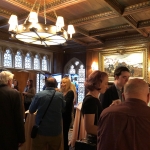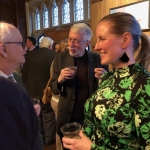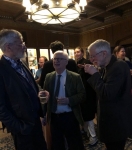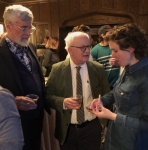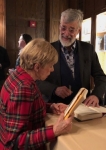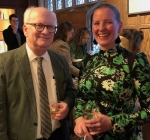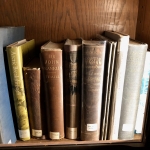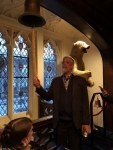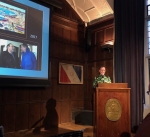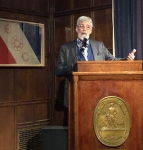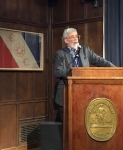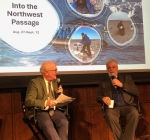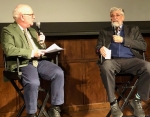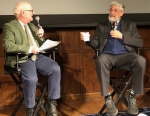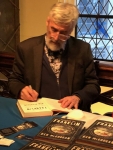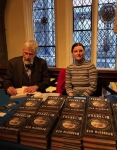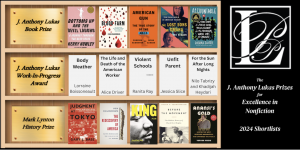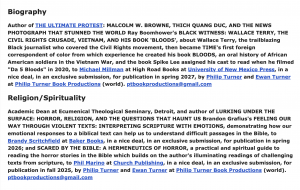In Conversation w/Canadian Author Ken McGoogan at The Explorer’s Club in NYC
In the early 2000s, when I was an editorial executive with Carroll & Graf Publishers, I had the good fortune to acquire the US publishing rights to a book first published in Canada, Fatal Passage: The Story of John Rae, the Arctic Hero Who Time Forgot and Ancient Mariner: The Amazing Adventures of Samuel Hearne, the Sailor Who Walked to the Arctic Ocean, what would prove to be only the first two books on polar exploration by Ken McGoogan, who has continued to immerse himself in the subject over the past twenty years, now having published a total of six Arctic books. A key development in that immersion has been his role as a resource historian for many sailings with Adventure Canada, a travel company that takes visitors on voyages to Canada’s northern reaches and in to the Arctic itself. 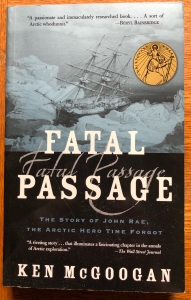
Fatal Passage chronicled the mystery of the ships HMS Terror and Erebus, which under the command of Royal Navy captain John Franklin, set off with more than 125 officers and crew on board in search of the Northwest Passage, but then disappeared never to be heard from again, at least not among Euro-centric people. Many search parties sought to learn the fate of Franklin and his men, including one helmed by John Rae, from Orkney in northern Scotland. He was the first European-based explorer to value highly the local knowledge of Inuit guides, hunters, and interpreters, who led him to eyewitnesses who’d seen hungry white seamen trekking across their lands in dire straits. They reported to Rae their understanding that to them these desperate men had engaged in cannibalism, feeding on the dead to try and save themselves. Rae’s discovery, though vetted by him with careful cross-questioning of the native witnesses, earned him a vituperative rebuke once back in England from Franklin’s wife, Jane Lady Franklin, who even enlisted Charles Dickens to editorialize against Rae. Fatal Passage effectively rehabilitated the reputation of John Rae, more than a century after it had been trashed by poobahs in Victorian England.
When it was published in the US, in 2002, the book won a Christopher Award, given to authors who produce works that “affirm the highest values of the human spirit.” McGoogan traveled from his home in Toronto to New York for the ceremony, and we began to get better acquainted as author and publisher, and as friends. Later, I made a road trip with my wife and son to Toronto and we enjoyed a dinner at Ken’s home with him and his artist wife Sheena. Another guest that night was Ken’s literary agent Beverley Slopen, from whom I’d acquired the rights to Ken’s books, and from whom I would later acquire rights to books by other Canadian authors, such as the mystery master Howard Engel, creator of the Benny Cooperman detective series.
Last December, Ken got in touch with me to extend an invitation. His latest book, Searching for Franklin: New Answers to the Great Arctic Mystery, was published in Canada last fall, and he explained to me it would be coming out in the US in the Spring of 2024. He would be coming down to New York to make a presentation on March 22 at the NY Public Library, in connection with a new exhibit, “The Awe of the Arctic” in the historic main library from March 15-July 13. A day prior to that, Ken said, he would be giving a talk at another public venue. He asked, in so many words, “Would you be interested in reading the new book, preparing some questions, and interviewing me at the first event?” After learning a few more details, including the fact there would be an honorarium to cover my preparation and for serving as his interlocutor, I readily accepted the exciting invitation.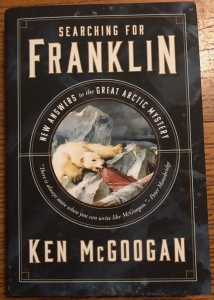
In January, I was even more excited to learn from Ken that the venue for our joint event would be The Explorer’s Club, a venerable institution on the east side of Manhattan established in 1904. On Honourary Canadian, the sister website to this one, I put up a post promoting our talk, chronicling my longtime association with Canada and Canadian authors, and drafted what I dubbed my Canadian-adjacent bio, touching on my longtime immersion in #CANLit and in reading and publishing tales of polar exploration.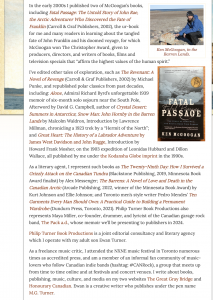
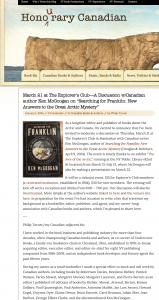
From Ken’s publisher—Douglas & McIntyre of Madeira Park, British Columbia, Canada—I received a copy of Searching for Franklin, and dove right into it. Rather than immediately noting possible questions for Ken while reading the book, I instead read it with a pencil in hand, scratching out asterisks in the margins next to passages that intrigued me, which I anticipated going back to once I’d finished the whole book, to mine them for the most resonant themes and to form the most stimulating questions I could think of for our discussion.
I found the book quite engrossing, and appreciated that it was written in multiple, contrasting styles of narrative nonfiction, though it’s all done without becoming jarring or off-putting. While most of is written in past tense, the norm for this sort of book prose, there are occasional passages in present tense, as when Ken and his fellow adventurers were actually touring the Arctic on an Adventure Canada cruise, and when they disembarked from the ship to traverse the ground where Franklin, his officers and crew, and their Inuit hunters, interpreters, and guides had trekked almost two centuries ago. Ken also presents some fascinating counter-factual possibilities that contrast with the known historical record, as he offers his best theory about what led to the tragic demise of Franklin and his two ships and the entire crew. Note with no spoiler: this new theory of his, appearing for the first time in Searching for Franklin is supported by medical reporting and highly informed speculation.
Last Thursday, the night of our discussion finally arrived. I was glad to be joined by my wife, artist Kyle Gallup, and my adult son Ewan Turner, who operates Philip Turner Book Productions with me; he is a creative writer publishing under the pen name M.G. Turner. After a friendly reception in the historic rooms of The Explorer’s Club, Ken McGoogan pulled on the rope that sounds the Club’s bell, calling the meeting to order, and an audience of what looked to be about seventy-five people took seats in the main hall. Following an introduction by Cedar Swan, the CEO of Adventure Canada, Ken gave a talk outlining his long association with the Franklin saga, going all the way back to the writing of Fatal Passage. Using slides, he described how Margaret Atwood had introduced him to Swan’s father Matthew, the founder of Adventure Canada; the many voyages he’s made with them over the past twenty years; how Franklin’s candidacy to lead the search for the Northwest Passage had been championed to the Royal Navy by Lady Franklin, even though his earlier expeditions had produced less than stellar results; John Rae’s discovery of Franklin’s fate; and the medical and dietary travails that he now believes led to the demise of so many of Franklin’s men. When he finished his presentation, it was time for our discussion.
I began, asking such questions as these (with appendices from my research in parentheses):
- Why did the idea of the Northwest Passage become so central to British myth-making about itself, and later to Canada’s own self-image? (In a discussion a day earlier when we met for a convivial dinner and to discuss the following night’s program, I referred Ken to such evidence of the rousing example from pop culture of Stan Rogers’ song “Northwest Passage,” a veritable Canadian national anthem, sung lustily by the barrel-chested musician (1949-83) on his debut album in 1981. So as to not lengthen the duration of our discussion unduly, I refrained from mentioning it then, but do so now for the sake of sharing more of my research.)
- How was it that young boys went to sea so young, including Franklin himself, at age twelve? (In another example from cultural history cited in camera to Ken, but not at the Club is the haunting folk song “The Captain’s Apprentice,” collected in 1905 by my favorite English composer Ralph Vaughan Williams, whose lyrics tell the sad tale of a boy treated roughly.)
- Can you contrast the leadership styles of John Rae and Franklin, with Rae seeming to show special regard for the well-being of his fellow expeditioneers, more so than Franklin?
- It’s amazing to me, as you write, that ships had libraries—1700 volumes on Franklin’s ship, which would have taken up a lot of room on board. Aboard ship, where living and sleeping quarters were notoriously tight, how did they accommodate so many books? (And, was there such a thing as a ship librarian? That would be the job for me.)
- You write that Charles Dickens at least allowed John Rae to publish a rebuttal to Lady Franklin’s accusations about him, but I wonder: Why did Dickens believe Lady Franklin’s slanders about Rae, at all?
- Can you explain why when Erebus and Terror were found in 2014 and 2016, they were forty miles apart in the Arctic Ocean?
- The caloric demand for portagers and voyageurs while doing all the enormously strenuous work on the trail must have been very high for them—while they carried 80-pound packs, in contrast to the sailors who carried a fourth of that weight—yet they often didn’t get the food they needed. How did they manage?
The discussion between the two of us transitioned into questions from members of the audience, with me calling on seven or eight people to stand and ask their questions, which were good ones. I enjoyed this part of the program very much, taking me back to my days when I moderated the community meeting of my college, Franconia College. After about an hour and twenty minutes, we concluded what had been a very enjoyable and stimulating program. The Explorer’s Club has posted it on their youtube page, so if of interest, you may view it via the link below.
I will conclude this post by making one more observation that I didn’t take the time to say last Thursday night. As my author Ruth Gruber (1911-2016)—about whom I’ve written often on this website—who I’ve observed with her spot reporting during and after WWII, and in such books as Exodus 1947: The Ship that Launched a Nation, became, in my opinion, the most prominent chronicler of DPs (displaced persons) following the war, Ken McGoogan has over the course of his six books on the Arctic become our foremost chronicler of the explorers who sailed across the Atlantic seeking navigable waterways spanning northern seas that would take them all the way to “Cathay”—a Pierre Berton for the twenty-first century. I’m glad I’ve been in a position to carry on a dialogue with Ken these past many years.
And here is a gallery of photos from the whole night, from the reception through Ken’s talk, and then from our discussion. All photos taken by Kyle Gallup.
- Reception at The Explorer’s Club
- From l.-r. Philip Turner; Bill Getz, Ingram Book Company; Cedar Swan, Adventure Canada;
- From l.-r., Ken McGoogan, Philip Turner, Bill Getz, Ingram Book Company
- From l.-r., Ken McGoogan, Philip Turner, Elizabeth Cronin, NY Public Library
- Ken McGoogan signing a book for a reader from Sudbury, Ontario, Canada.
- Philip Turner w/Cedar Swan, Adventure Canada
- Books on John Franklin in The Explorer’s Club library
- Ken McGoogan, shadowed by a mounted polar bear, pulling on the bell rope
- Cedar Swan, introducing Ken McGoogan
- Ken McGoogan, w/the Explorer’s Club flag and medallion.
- Ken McGoogan is a voluble public speaker.
- We began our discussion by talking about the Northwest Passage
- We had a vigorous discussion.
- Ken and I, in a mirthful moment. enjoyed
- Ken, signing a copy of “Searching for Franklin.”
- Ken McGoogan, with the bookseller from Shakespeare & Co., Jesse.

